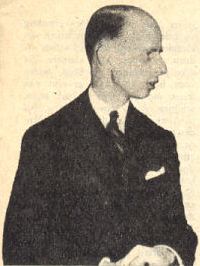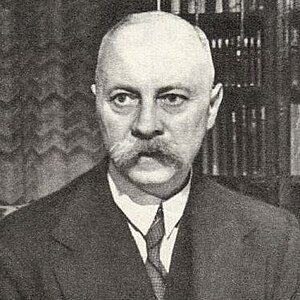
Hendricus Josephus Franciscus Marie (Henk) Sneevliet, known as Henk Sneevliet or by the pseudonym "Maring", was a Dutch Communist, who was active in both the Netherlands and the Dutch East-Indies. As a functionary of the Communist International, Sneevliet guided the formation of the Communist Party of China in 1921. In his native country, he was the founder, chairman and only Representative for the Revolutionary Socialist (Workers') Party, RSP/RSAP. He took part in the Communist resistance against the Nazi occupation of the Netherlands during World War II, for which he was executed by the Germans in April 1942.

Despite being neutral, the Netherlands in World War II was invaded by Nazi Germany on 10 May 1940, as part of Fall Gelb. On 15 May 1940, one day after the bombing of Rotterdam, the Dutch forces surrendered. The Dutch government and the royal family saved themselves by going to London. Princess Juliana and her children moved on to Canada for additional safety.
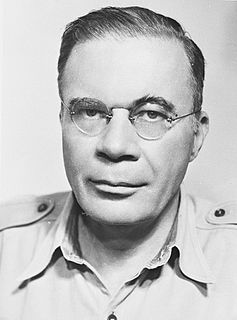
Hubertus Johannes "Huib" van Mook was a Dutch administrator in the East Indies. During the Indonesian National Revolution, he served as the Acting Governor-General of the Dutch East Indies from 1942 to 1948. Van Mook also had a son named Cornelius van Mook who studied marine engineering at the Massachusetts Institute of Technology. He also wrote about Java - and his work on Kota Gede is a good example of a colonial bureaucrat capable of examining and writing about local folklore.

Louis Joseph Maria Beel was a Dutch politician and diplomat of the defunct Roman Catholic State Party (RKSP) and later co-founder of the Catholic People's Party (KVP) now merged into the Christian Democratic Appeal (CDA) party and jurist who served as Prime Minister of the Netherlands from 3 July 1946 until 7 August 1948 and from 22 December 1958 until 19 May 1959.

Pieter Sjoerds Gerbrandy was a Dutch politician of the defunct Anti-Revolutionary Party (ARP) now merged into the Christian Democratic Appeal (CDA) party and jurist who served as Prime Minister of the Netherlands from 3 September 1940 until 25 June 1945.

The Supreme Court of the Netherlands, officially the High Council of the Netherlands, is the final court of appeal in civil, criminal and tax cases in the Netherlands, including Curaçao, Sint Maarten and Aruba. The Court was established on 1 October 1838 and is located in The Hague.

The Allied leaders of World War II listed below comprise the important political and military figures who fought for or supported the Allies during World War II. Engaged in total war, they had to adapt to new types of modern warfare, on the military, psychological and economic fronts.

Henriette Nanette "Jetty" Paerl was a Dutch singer and resistance member of Jewish origin. She is known for being one of the Netherlands' representatives in the Eurovision Song Contest 1956 with the song "De vogels van Holland", and for being the first singer ever to perform in the Eurovision Song Contest.

Koninklijke Paketvaart-Maatschappij, better known as KPM, was a Dutch shipping company (1888–1966) in the Netherlands East Indies, now Indonesia. It was the dominant inter-island shipping line in Indonesia during the last half century of the colonial era. KPM maintained connections between the islands of Indonesia,

The Deutsche Zeitung in den Niederlanden was a German-language nationwide newspaper based in Amsterdam, which was published during almost the entire occupation of the Netherlands in World War II from June 5, 1940 to May 5, 1945, the day of the German capitulation in the "Fortress Holland". Its objective was to influence the public opinion in the Netherlands, especially the one of the Germans in this country.

Margaretha Albertina Maria "Marga" Klompé was a Dutch politician of the defunct Catholic People's Party (KVP) now merged into the Christian Democratic Appeal (CDA) party and chemist. She was granted the honorary title of Minister of State on 17 July 1971.
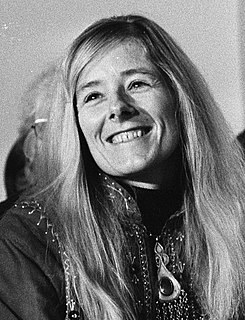
Johanna Elisabeth (Joke) Smit was a well-known Dutch feminist and politician in the 1970s.

Johan Rudolph Thorbecke was a Dutch statesman of a liberal bent, one of the most important Dutch politicians of the 19th century. In 1848, he virtually single-handedly drafted the revision of the Constitution of the Netherlands, giving less power to the king and more to the States General, and guaranteeing more religious, personal and political freedom to the people.

Edzo Hendrik Toxopeus was a Dutch politician and diplomat of the People's Party for Freedom and Democracy (VVD) and jurist. He was granted the honorary title of Minister of State on 22 January 1985.
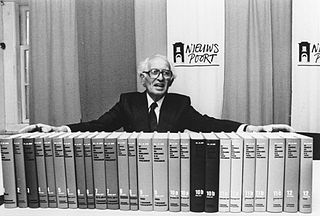
The Kingdom of the Netherlands During World War II is the standard reference on the history of the Netherlands during World War II. The series was written by Loe de Jong (1914–2005), director of the Dutch Institute for War Documentation, and was published between 1969 and 1991. The series contains 14 volumes, published in 29 parts. De Jong was commissioned to write the work in 1955 by the Ministry of Education, Culture and Science. The first volume appeared in 1969, and de Jong wrote his last in 1988. The final volume, containing critique and responses, appeared in 1991.

Surinam was a Dutch plantation colony in the Guianas, neighboured by the equally Dutch colony of Berbice to the west, and the French colony of Cayenne to the east. Surinam was a Dutch colony from 26 February 1667, when Dutch forces captured Francis Willoughby's English colony during the Second Anglo-Dutch War, until 15 December 1954, when Surinam became a constituent country of the Kingdom of the Netherlands. The status quo of Dutch sovereignty over Surinam, and English sovereignty over New Netherland, which it had conquered in 1664, was kept in the Treaty of Breda of 31 July 1667, and again confirmed in the Treaty of Westminster of 1674.

The Netherlands Indies Civil Administration was a semi-military organisation, established April 1944, tasked with the restoration of civil administration and law of Dutch colonial rule after the capitulation of the Japanese occupational forces in the Netherlands East Indies after World War II.

Jacob Emil "Dick" van Hoogstraten (1898–1991) was a Dutch public servant in the Dutch East Indies from 1922 to 1949, functioning as Director of the Department of Economic Affairs from 1942 to 1949. He was one of the architects of economic recovery from the economic crisis of the early-1930s and the economic set-back of the Japanese occupation during the early-1940s in Indonesia.

Wim van Norden was a Dutch journalist. He was one of the founders of the resistance paper Het Parool during World War II. He was jailed for six months by the Germans in 1942 but was later released due to lack of evidence for his involvement with Het Parool. Van Norden was active in the resistance for the remainder of the war. After the war he became director of the newspaper and although he originally planned to serve for only several months he kept his function until 1979. Van Norden was responsible for the founding of the publishing company Perscombinatie in which three newspapers worked together.
Gerhard Hirschfeld is a German historian and author. He was director of the Stuttgart-based Bibliothek für Zeitgeschichte / Library of Contemporary History, and has been a professor at the Institute of History of the University of Stuttgart since 1997. In 2016 he also became a Visiting Professor at the Institute for International Studies, University of Wuhan/China.
